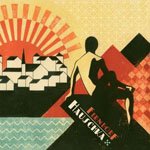
Hauschka Ferndorf
(130701 / Fat Cat)
I got quite carried away by Hauschka’s first album on Fat Cat’s spin-off (post-) classical label, 130701, Room to Expand. It’s one of a handful of albums that have been released in recent years exploring the possibilities of the prepared piano. This curious musical beast, in its classical form popularised by John Cage and Arvo Part, working from the innovations of Henry Cowell, but with roots in the work of Satie and even Mozart’s “Turkish Rondo,” takes the piano, an instrument designed for precision, repeatability, and evenness of tone, and with the addition of bits of metal, paper, and other interventions on the part of the composer, adds new textures, tones, and nuances.
Hauschka is the performing name of Volker Bertelmann, a German pianist and composer who studied classical piano for ten years, and having released a series of albums of prepared piano work, has subsequently collaborated with Stefan Schneider and Luke Sutherland in Music A.M., as well as touring with Múm, Colleen, and Max Richter.
Ferndorf, whose title is inspired by the small rural village in which Bertelmann grew up, explores both in its titles and in the texture of its music the experience of being close to nature: the mountains, lakes, and forests of his hometown are both named and sketched in the songs here. Musically, the album boasts a broader palette than Room to Expand: there are more instruments, songs are longer, more coherent, and more developed, and there is a stronger sense of this having been put together as an album, rather than a collection of themes.
That said, some of the verve and invention of Room to Expand is lost, and not all the tracks come off. Rode Null, for example, starts like the music to an 80s quiz show and never really takes off from there. Many of the songs, Heimat being probably the most noteworthy example, sound a lot like they are paying homage to Satie, or trying to be tracks from a Tiersen soundtrack. That’s not a criticism in itself, but a way of saying that some of the surprise and edge of Room... is missing.
The best moments, I’d suggest, are when we stray from the classical prepared piano into that other messed up piano sound: the tack piano of ragtime, the battered sounds of a drink-soaked old Joanna, as heard on Freibad, which is as much fun as anything on the earlier album.
Ferndorf covers a range of emotions and styles, and once again showcases both the inventiveness of Bertelmann and the scope of the prepared piano. It takes the music of Hauschka perhaps into more populist directions, but the experiment and joy still survive.
4 October, 2008 - 21:22 — Ben Bollig